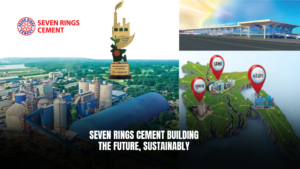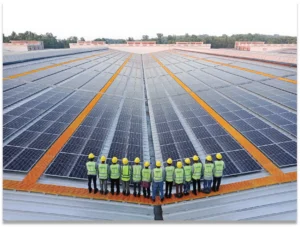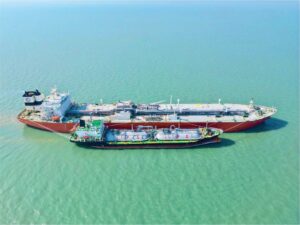RELATED INDUSTRY

SEVEN RINGS CEMENT BUILDING THE FUTURE, SUSTAINABLY
SEVEN RINGS CEMENT’s Commitment to a Stronger, Greener Bangladesh. In a nation where infrastructure is the backbone of economic growth and social progress, the quality and resilience of building materials are non-negotiable. As Bangladesh strides confidently towards its development goals, the construction sector stands at the forefront of this transformation. At Seven Rings Cement, we are not just suppliers of a fundamental material; we are partners in nation-building, committed to fuelling this progress with advanced technology, an unwavering commitment to quality, and a deep sense of environmental responsibility. As part of the Hong Kong-based multinational Shun Shing Group—founded in 1988 and a leading raw material supplier in Asia—Seven Rings Cement began its journey in Bangladesh in 1991. Fueled by market confidence and backed by the unparalleled raw material expertise of our Group’s trading arm, Cemcoa, we have grown into a premier manufacturer. Today, we operate with an annual installed production capacity of 8.4 million metric tons, delivering consistent, superior-quality cement to the nation’s development for over three decades. ENGINEERING STRENGTH WITH TECHNOLOGICAL EXCELLENCE At the heart of Seven Rings Cement’s operations lies a relentless pursuit of technological advancement. We understand that the integrity of every bridge, high-rise, and highway begins with the microscopic precision of its core material. Our state-of-the-art manufacturing plant is equipped with cutting-edge automation and process control systems, ensuring unparalleled consistency. This includes a unique technological setup in Bangladesh, featuring both Vertical Roller Mills (VRM) and Ball Mills, integrated with roller press technology for specialized slag grinding. Our commitment to quality is validated by rigorous independent testing. Seven Rings Cement is consistently evaluated and certified by premier national institutions including BUET, CUET, RUET, MIST, IUT etc. as well as by international testing bodies. This multi-layered verification ensures that every kilogram, whether a high-early-strength variant for rapid projects or a specialized grade for mega-infrastructure, delivers guaranteed, uncompromised performance—meeting and exceeding both local and global standards. A ROBUST DELIVERY SYSTEM: THE PROMISE OF RELIABILITY A superior product is only as good as its availability. Recognizing the critical timelines of modern construction, Seven Rings Cement has invested significantly in building one of the most robust and reliable supply chain and delivery systems in the industry. As the only cement manufacturer in Bangladesh with integrated production facilities in three strategic locations—Dhaka, Chittagong, and Khulna—we have established an unparalleled logistical advantage. Our extensive network, comprising a dedicated fleet and strategically placed distribution hubs radiating from these plants, ensures that our cement reaches every corner of the country promptly and in pristine condition. This tri-factory footprint minimizes transport time and cost, guaranteeing a steady, responsive supply to projects of all scales. GREEN MANUFACTURING: A PLEDGE TO THE PLANET True leadership in today’s industrial landscape means prioritizing the planet alongside productivity. Seven Rings Cement is profoundly committed to sustainable manufacturing, with a vision that extends beyond our borders—including our Green Factory in Dubai, which sets a global benchmark for eco-friendly production. Domestically, our initiatives in energy efficiency, waste heat recovery, and responsible resource management have firmly established our sector leadership. This comprehensive dedication has been nationally recognized with the prestigious Green Factory Award 2025, an accolade that celebrates our holistic environmental stewardship. We have implemented advanced systems to significantly reduce carbon emissions, conserve water, and maximize the use of alternative and recycled materials across our operations. By embracing greener practices locally and globally, we are actively reducing the environmental footprint of the construction industry, ensuring that the growth we help create today safeguards the well-being of future generations. THE CORNERSTONE OF QUALITY: PROVEN ON BANGLADESH’S MEGA PROJECTS Quality is a promise validated on the grandest stages. The rise in per capita cement consumption must be matched by a demonstrable commitment to excellence, and Seven Rings Cement’s quality is proven where it matters most: in Bangladesh’s landmark mega projects. Our cement has been a trusted component in the construction of critical infrastructure that defines modern Bangladesh. From the iconic Padma Bridge, a symbol of national pride and engineering marvel, to the Hatirjheel Integrated Development Project that transformed urban mobility in Dhaka, Seven Rings Cement has provided foundational strength. Our products have been integral to key national infrastructures like the Payra Port, and critical roadways such as the Sylhet-Mymensingh Highway. We are a trusted cement supplier to major government entities, including BMTF and MES, supporting defense and public construction projects nationwide. Our cement has also contributed to key aviation expansions at Shahjalal International Airport, Cox’s Bazar Airport, and Sylhet Osman Goni Airport, and vital urban transport links including the Metro Rail, Kuril Flyover, and Mayor Hanif Flyover. Most significantly, we are proud to be associated with the Rooppur Nuclear Power Plant, Patuakhali 330 MW Power Plant where uncompromising material quality is essential for national energy security. A SHARED VISION FOR NATIONAL PROSPERITY Much like the visionary approaches seen in allied building materials industries, Seven Rings Cement believes in the transformative power of core materials. We see our role as integral to developing a self-reliant industrial ecosystem. Our journey is aligned with the nation’s aspirations. As per capita cement consumption grows and mega projects reshape our horizon, Seven Rings Cement remains a dedicated partner. We continue to innovate, strengthen our delivery promises, and deepen our green initiatives, Seven Rings Cement remains a dedicated partner in constructing a stronger, more resilient, and greener Bangladesh—one solid, responsible foundation at a time.
Read More
SOLARIC GROUP – DEVELOPS WORLD LARGEST SINGLE-SITE ROOFTOP SOLAR PROJECT
SOLARIC Group installed the world’s largest industrial rooftop solar system in the Korean EPZ of Chattogram in 2020. The company has already completed 120 MWp of rooftop solar projects in the country and has created employment for more than 100 engineers and other professionals. In association with Infrastructure Development Company Limited (IDCOL) through multiple NGO’s, SOLARIC Group supplied more than 5 lakhs solar home systems in villages across the country. The most iconic project that has been developed at KEPZ-50MWp in Chattogram by Youngone Corporation. And, Solaric is the EPC partner of the world’s largest single-site project. They basically started to work with Youngone Corporation in 2019. They already completed 40 MW which will be enhanced to 50 MW by June 2025. As Bangladesh faces energy crisis, Didar Islam, founder Solaric, tried to learn how to utilize the unutilised rooftops of the industries. Now, different industrialists of ready-made garments (RMG) and textiles, ceramic, plastic, and footwear are eager to use the solar panels on their rooftops. Solaric installed 21 rooftop projects of different companies and organisations from 2015 in industrial zones like Dhaka, Gazipur, Narsingdi, and Savar. Of these, the company installed solar panels on Bangladesh Bank’s rooftop in 2015, Markup Accessories Ltd and Debonair Group in 2018, Youngone Corporation and AKH Group in 2020, IRIS Fabrics, Tasniah Fabrics and Palmal Group in 2021, Khantex Fashion in 2022, BSEZ, Micro Fibre Group, FM Plastic Industries, Coats BD, Amanat Shah Group, Blue Ocean Footwear, and Masco Group in 2023, Ha Meem Group (Phase-2), Mondol Intimates, Checkpoint System, Nexus Sweater Industries and Logos Apparels in 2024. Average investment cost for every megawatt renewable energy is Tk. 10 million. With a vision to resolve the energy crisis in Bangladesh through renewable energy, Solar Intercontinental (Solaric) Limited was founded in early 2009 by Didar Islam, an electrical engineer and a scientist. Didar, also a former teacher at the Bangladesh University of Engineering and Technology (BUET), founded Solaric, a research and development (R&D)-driven technology company in Bangladesh focusing on developing appropriate technologies for both on-grid and off-grid solar applications, and has been awarded nine patents in the USA. The company developed its technology and system in 2010 and went into commercial operation in 2011. In an exclusive interview with Ceramic Bangladesh, the Director of Solaric Group, Engineer Naznin Akther said that Solaric PLE Ltd. is registered in Singapore in 2015 as a group of renewable energy development companies and a subsidiary in Bangladesh to implement large-scale industrial rooftop solar projects based on both CapEx and OpEx models. She, also the younger sister of Didar, said “we are the only solar company in Bangladesh with a private equity investor (OSIRIS), which helps the company grow exponentially by offering industrial rooftop solutions to factory owners with appropriate financial solutions.” “In 2000, Didar invented the world’s only CMOS single chip radio, known as QWIKRADIO, with 13 US patents. Then, he explored different ways it could be utilised in Bangladesh’s power sector. Later on, he started working on Analog IC design for portable power applications and launched a firm named after Power IC Ltd. with young engineers from BUET,” Naznin also said. She informed that her brother invented the Solar Optimizer, a single device to combine all solar electronics. Renewable energy solutions for industry She also informed that the company completed 15 projects on households. Earlier, people used 3% of their demand from rooftop solar following the government rule. But they did not think about the potential of an energy solution. Now they realise that an entire industry’s demand for power supply can be met by solar. In 2018, Solaric installed a 300 KW solar panel through the OpEx model (by own investment) on the rooftop of Debonair Group. Now, they sell electricity to the company. They are now working with 10 big companies, including Palmal Group, Micro Fibre, and Coats BD. “We now have 7.5 MWp in operation under the OpEx model. In addition, 30 MW is coming under the model”, she also informed. “We have developed more than 100 MWp of rooftop solar on-grid power plants with few of them under net metering all over Bangladesh. Under net metering, consumers with solar panels or other renewable energy systems can generate electricity and feed any excess energy back into the grid. Unlocking Rooftop Renewable Energy Potential Bangladesh, with its limited land availability, has experienced a surge in demand for rooftop renewable energy (RE). The market potential is substantial, boasting a total capacity of 6000 MW due to the country’s expansive rooftop space. Notably, the agriculture sector significantly contributes to this growing demand. Furthermore, the Mujib Climate Prosperity Plan mandates that industrialists ensure 40% of their energy comes from renewable sources. This commitment aligns with the global push toward sustainable practices and underscores the urgency of transitioning to cleaner energy alternatives. Surprisingly, only 5% of industrial rooftops have been utilized for solar installations, leaving more than 95% of rooftops untapped. Solar energy emerges as the most viable and cost-effective option for RE adoption. The ceramics industry also holds promise for RE adoption. Several major ceramic companies have engaged in discussions and responded positively. To establish a comprehensive solar project, approximately 15 types of products—such as solar modules, inverters, cables, structures, and communication devices—are essential. However, managing dust risks prevalent in Bangladesh’s cities remains a significant challenge for solar panel. Bangladesh stands at the cusp of a renewable energy revolution, and proactive measures can propel us toward a greener and more sustainable future. Advantages of Solar Energy Usage By using solar power, individuals can save up to 15% compared to relying solely on the existing grid. Solar energy provides a green alternative at a lower cost. When the off-peak grid electricity rate stands at Tk 9.75, solar energy can be harnessed at Tk 8.50. A seventy-thousand-square-foot rooftop can accommodate a 1-megawatt solar installation. This capacity translates to generating power equivalent to Tk 1 million per month. Solar projects typically span 30 years, with a maximum payback period of 5
Read More
Industry awareness necessary for safe, environment-friendly LPG: Omera CEO
Industry awareness necessary for safe, environment-friendly LPG: Omera CEO Uninterrupted supply of natural gas at the proper pressure is essential as a fuel for the ceramic industry. However, currently, most of the industries are not getting it timely and properly. So, the use of alternative gas is increasing. And in continuity of this, the use of Liquid Petroleum Gas (LPG) has started in the ceramic industry, though it is a bit expensive. According to Petrobangla currently the natural gas demand in the country is about 4000 million (MMCFD). Supply is 2700-2800 mmcfd. Of this, 700 to 800 mmcfd is being supplied from imported Liquid Natural Gas (LNG). There is a shortfall between demand and supply about 1200-1300 mmcfd. A large ceramic company needs at least 900 tonnes LPG a month, if it is used there. In all, around 65,000 tonnes LPG is needed in 70 ceramic companies of the country every month, if they continue production in their factories based on LPG only. The demand for increasing gradually in both ceramic and apparel industry following environment issues and energy shortage. Omera LPG now the market leader In eight years of operation, Omera LPG has become the market leader with the highest market share in the country’s LPG sector. It is known for high safety standards, consistent LPG supply round the year and excellent customer service (Hotline 16797). Omera imports LPG from the Middle East countries including Saudi Arabia and Qatar as well as the USA, and shipping it to Kutubdia of Cox’s Bazar by very large gas carriers (VLGC). Then, the LPG is transferred to smaller LPG ships (coasters) by ship-to-ship transfer. The coaster vessels make onward delivery of LPG to their plants in Chattogram and Mongla. They also sell LPG from the VLGC to other operators. Omera stores and bottles the LPG in its five plants of different locations in Bangladesh. The gas is bottled in 5kg, 12kg, 25kg, 35kg and 45kg gas cylinders. After fulfilling national demand, it is exporting the LPG to seven north-east states of India. Its sister concern, Omera Cylinders limited, manufactures LPG cylinder factory in Habiganj district. It exports to African countries. Omera Cylinders Limited is manutacturing new cylinders and retesting/refurbishing cylinders of third party LPG operators Bangladesh. Now the total import of LPG for Bangladesh is approximately 1,20,000 tonnes per month. Omera sells around 27,000 tonnes a month through retail, industrial, auto gas and export. Its group also sells LPG to other operators from the VLGC. So, in total its LPG supply to Bangladesh stands at 45,000 tonnes a month. With more than 35,000 retailers and over 5 million cylinders in residents across Bangladesh, Omera aims to cater the demand of environment-friendly LPG for all segments. LPG’s demand will double by 2030. In 2022, Omera noticed that industries were increasingly seeking energy to heat their boilers and furnaces. Then, it started a new division named ‘Omera Priority’ which brings the most secure and reliable LPG solution for an industrial heating needs. Tanzeem Chowdhury claimed, LPG price is now lower than diesel’s as the government has withdrawn subsidy on the fuel oil. Besides, the industrialists complain about not getting pipe gas properly. So they lean to use LPG. He said that LPGS price is somewhat high compared to natural gas as the government i providing subsidy on pipe gas. But now LPG price is lower than diesel/furnace oil as the government has withdrawn subsidy on diesel. The price of LPG Is Tk 107- per kg while diesel Tk 109 each litre. Besides, the price of LNG is USS 12.70/MMBTU; CNG Tk 43/cubic metre (cbm); NG (Industrial) Tk 30/cbm; NG (Captive Power) Tk 30/cbm, and Tk 130/L. If the government withdraws subsidy from pipe gas, the price will be almost same between LPG and pipe gas. However, the government should create awareness among industrialists to use safe and the environment-friendly energy. LPG is much safer than pipe gas Considering this, Omera has launched a new solution called ‘SNG. When natural pipe gas pressure drops in ceramic industry, its LPG will enter into heater through software. There is absolutely no downtime/ changeover time, so the heater will not be shut down. Now they are getting good response from ceramic manufacturers. Already they have provided the services at some large ceramic companies who are happy getting it. LPG demand is also rising in this sector. If all the companies take services from Omera, there won’t remain any gas crisis and they have that capacity to supply. LPG is safer than pipe gas line. Omera has over 5 million cylinders in residents. Very few accidents occurred in the LPG in industry till now; rather, pipe gas caused accident several times. The company conducts safety audit yearly. Clear policy is crucial for investment Mr. Tanzeem Chowdhury said, “The demand for LPG is increasing gradually, thanks to rising population and changing people’s lifestyle. Now our sale is mostly in cities but the demand is going up in village too. We want to supply our LPG secure and easily, utilising latest technology to boost market share. As we are financially strong so we have no problem of L/C opening now. But our problems are unclear policy and unadjusted price. A clear policy is needed, as to who will get natural gas (NG) and who will not. Unclear policy makes hurdles to investment. Policy is crucial for local and foreign direct investment as well.” He added that Bangladesh Energy Regulatory Commission (BERC) fixed bottled gas price (Local portion) in 2021. “But it should be adjusted with the current inflation. Some foreign companies are showing interest to invest in the sector as LPG is promising in Bangladesh.”
Read More
